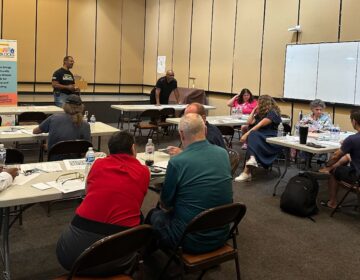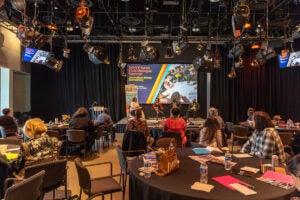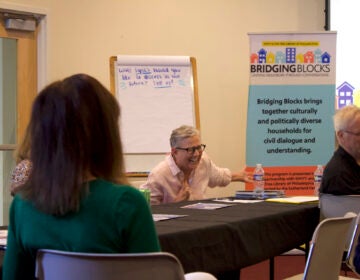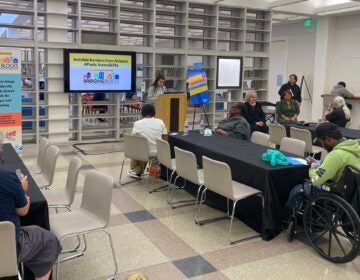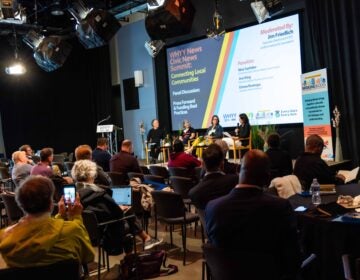Philadelphia residents discuss concerns about voting during WHYY’s latest Bridging Blocks event
Some residents cite a lack of trust in elected officials as a reason for historically low voter turnout rates in Philadelphia.
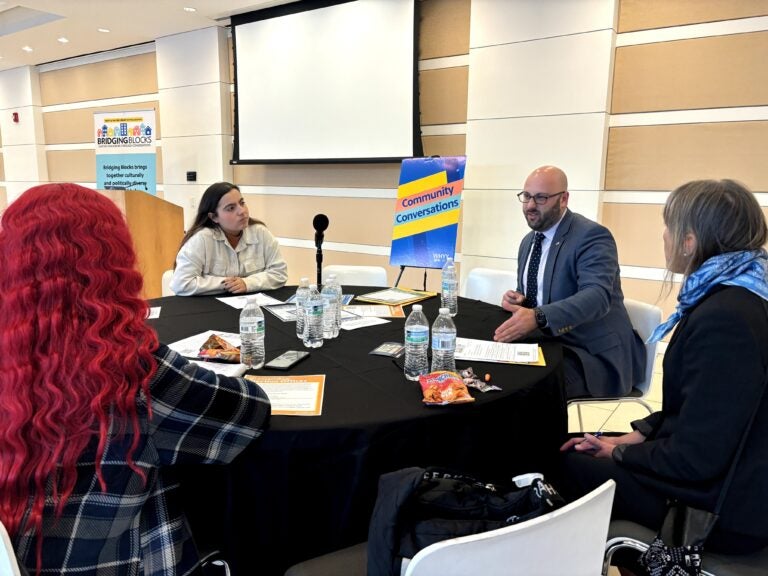
City Commissioner Seth Bluestein discussed the city's new satellite offices, which he hopes makes Philadelphia residents "feel more connected" to their elected officials. (Live Barry/WHYY)
What questions do you have about the 2024 elections? What major issues do you want candidates to address? Let us know.
Voting continues to stir conversation in Philadelphia with the presidential election just a few weeks away. From neighborhood canvassers to a barrage of political commercials, the subject looms as candidates try to grasp the votes of Pennsylvania, a key swing state in the upcoming election.
Philadelphia has a historically low voter turnout. Only 17% of registered voters in the city showed up to the polls in April for the Presidential primary, according to city commissioners.
To discuss the voting habits of Philadelphians, WHYY News’ Bridging Blocks tackled the issue Tuesday with a discussion titled “Does Voting Matter: Yay or Nay.”
Citizens met at the Parkway Central Library for the community discussion hosted and moderated by WHYY’s Eric Marsh Sr. and Tony Cuffie. Philadelphia City Commissioner Seth Bluestein, Deputy City Commissioner Khalif Chestnut and City Voter Education Coordinator Samuel Forman were in attendance.
One of the most prevalent issues of the night was the trust, or lack thereof, in elected officials.
West Philadelphia resident Ofonime Idiong said that she, along with other young voters, struggle to believe the promises that politicians campaign on.
“I think that the biggest issue with voting is getting people to a place of actively … believing that there is even a point to engaging with the political system. Elected officials will do what they want anyways, so why even add my voice? Does my voice matter in the first place?” Idiong said.
The issue of trust is “complicated,” Idiong suggested, as young voters tend to not just be disengaged from voting, but also from alternative political action, like organizing.
Commissioner Bluestein explained that one of the key ways to build trust with young voters is through conversation. Prior to the evening’s event, he visited seniors at a local high school to discuss why their vote matters.
“Eighteen-to-34-year-olds are the largest block of registered voters for the city. They can have the most impact if they choose to turn out to vote, but they’re not coming out, which means that older generations have a bigger impact,” Commissioner Bluestein said. “If you think the issues that matter to you as a young person are different, then you have to make your votes heard.”
“There’s a lack of political acuity with [young voters],” Idiong said. “So, when they’re not involved, they’re not involved with anything at all.”
Attendees shared a concern regarding accessibility, as some did not feel like they could easily reach their local representatives.
“It could be a big difference maker in our local counties and communities if some of these elected officials, judges … they would actually be seen out and about and engaged with the public so that we know who they are,” Rubin Rubio said.
In response to Rubio’s concern, Marsh recalled a moment from a previous Building Blocks event when City Commissioner Omar Sabir upset participants when he left a discussion about voting early due to a prior commitment.
“Even if your schedule is packed, you’ve got all of this stuff going on, [politicians] have to look at that and say, ‘We gotta get one time we can get in front of these people’ … and it’s not just ‘I gotta pop in and I gotta go,’” Rubio said.
Idiong noted that she wants to see elected officials in her neighborhood outside of election season, when she most often sees politicians engaging with her community.
“Maybe there’s a way outside of election seasons to have [politicians] within the community,” she said. “When I go back to my community, there is no one within the City Council or mayor’s office who’s checking up on the citizens.”
Commissioner Bluestein explained that city officials recently implemented satellite election offices to make representatives more accessible to the public.
The city’s election offices, located in all 10 Philadelphia council districts, are open seven days a week until Election Day for community members to reach their representatives. Following the election, the offices will continue to operate year-round.
“I want to have the mayor come out to each of these offices and meet with the community and engage in these conversations to find out what your needs are, so that you can actually feel represented and like you’re listened to,” Bluestein said. “So hopefully, when we have this conversation again four years from now, you’ll say to me, ‘Seth, you were right. They didn’t just disappear. They stayed and engaged with us, and now we feel a little bit more connected to our government.’”
The next Bridging Blocks event will be a discussion on the state of small businesses in Philadelphia and held on Thursday, Nov. 7 at 5:30 p.m. at the Parkway Central Library.
Bridging Blocks is a WHYY and Free Library partnership fostering civil dialogue and understanding between diverse households. It is made possible thanks to the generous support of Fred and Barbara Sutherland.

Get daily updates from WHYY News!
WHYY is your source for fact-based, in-depth journalism and information. As a nonprofit organization, we rely on financial support from readers like you. Please give today.


